|

by Wendy McElroy
August 11, 2012
from
LaissezFaireBooks Website
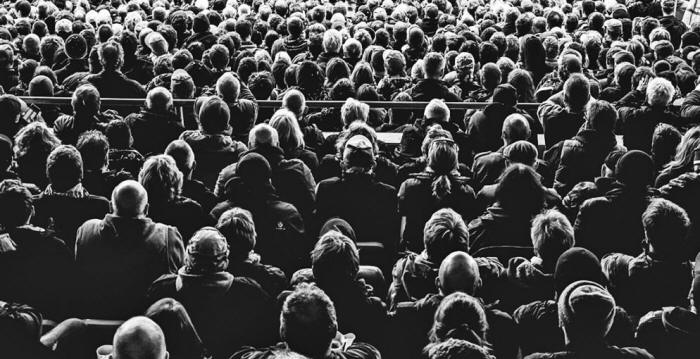
In entry-level philosophy
class, a professor will often present a scenario that seems to
challenge the students' perspective on morality.
The argument runs
something as follows:
"The entire nation of
France will drop dead tomorrow unless you kill your neighbor who
has only one day to live. What do you do?"
Or "You could eliminate cancer by pressing a button that also
kills one healthy person. Do you do so?"
The purpose is to create
a moral dilemma.
The questions pit your
moral rejection of murder against your moral guilt for not acting to
save millions of lives.
In reality, the questions are a sham that cannot be honestly
answered. They postulate a parallel world in which the rules of
reality, like cause and effect, have been dramatically changed so
that pushing a button cures cancer.
The postulated world
seems to operate more on magic than reality.
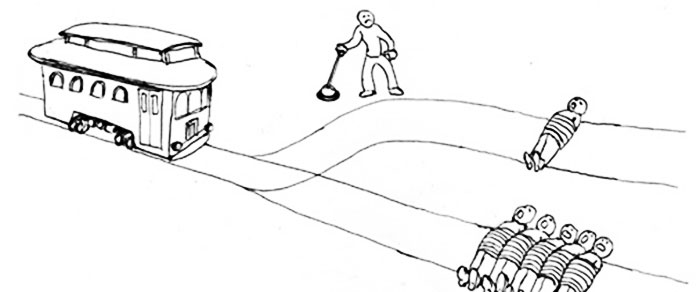
A depiction of the Trolley Problem,
a
thought experiment in philosophy
introduced by Philippa Foot in 1967
that is
designed to pose a moral dilemma.
Because my moral code is based on the reality of the existing world,
I don't know what I would do if those rules no longer operated.
I presume my morality
would be different, so my actions would be as well.
As absurd as they are, these are considered to be the "tough" moral
questions. In grappling with them, some students come to believe
that being true to morality requires the violation of morality in a
profound manner:
after all, there is no greater violation than the
deliberate murder of another human being.
But how can the life of one outweigh those of millions in your
hands?
At this point, morality
becomes a numbers game, a matter of cost-benefit analysis, rather
than of principle. This is not an expansion of morality, as the
professor claims, but the manufacture of a conflict that destroys
morality.
In its place is left a
moral gray zone, a vacuum into which utilitarianism rushes.
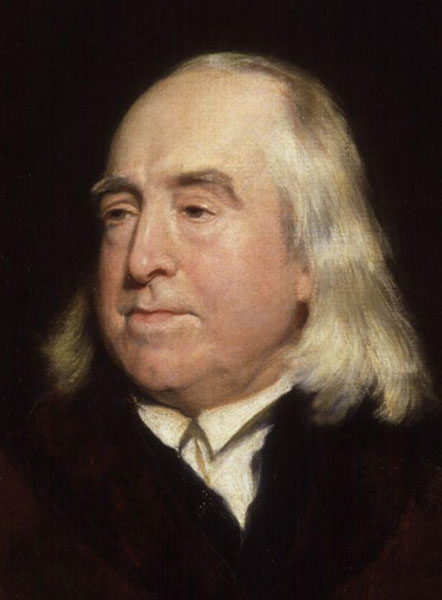
Portrait of Jeremy Bentham
by
Henry William Pickersgill.
Bentham
is regarded as the founder
of
modern Utilitarianism.
Suddenly, it becomes obvious that the good of the many outweighs the
murder of the one.
The collective outweighs
the individual.
The majority outranks the minority. Hard "factual"
utilitarianism is preferable to gray, inconsistent morality.
The philosophical questions lead directly into politics because
murdering a person for the greater good is not merely a moral
question, but also one of individual rights. If you accept the
morality of doing so, you have also accepted the political propriety
of murdering an innocent human being.
Phrased in political terms, non-hypothetical versions of the
philosophy question come up often.
For example,
"Should the rich or
businessmen (the few) be heavily taxed to provide national
health care (for the many)?"
Here, a greater good is
pitted against individual rights.
But more than this,
individual rights of two groups conflict, with the rights of a
resisting minority viewed as a barrier to the "rights" or
entitlements of "the others."
Businessmen are deemed to
have no right to their earnings if it prevents the majority from
having health care.
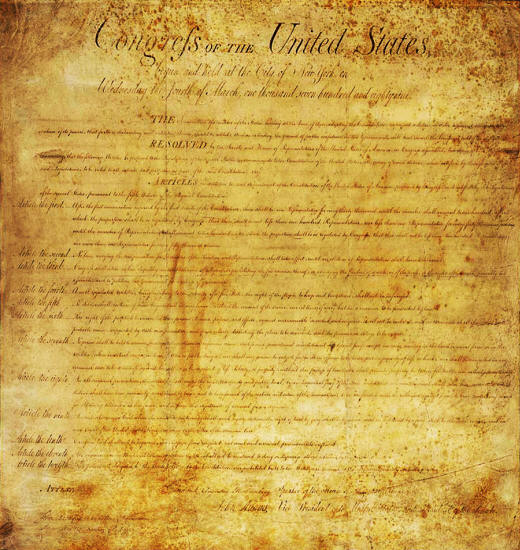
The Bill of Rights, twelve articles of amendment
to the to the United States Constitution proposed in 1789,
ten of which, Articles three through twelve,
became part of the United States Constitution in 1791.
This politically manufactured conflict is as absurd as the
philosophically manufactured one.
The 19th-century British individualist
Auberon Herbert
addressed the issue of the "good of the greatest number."
He stated,
"There never was
invented a more specious and misleading phrase.
The Devil was in his
most subtle and ingenious mood when he slipped this phrase into
the brains of men. I hold it to be utterly false in essentials."
Why is it false?
Because the phrase
assumes as a given that a higher morality requires the violation of
individual rights.
Or in Herbert's words,
"It assumes that
there are two opposed 'goods,' and that the one good is to be
sacrificed to the other good.
But in the first place, this is
not true, for liberty is the one good, open to all, and
requiring no sacrifice of others, and secondly, this false
opposition (where no real opposition exists) of two different
goods means perpetual war between men".
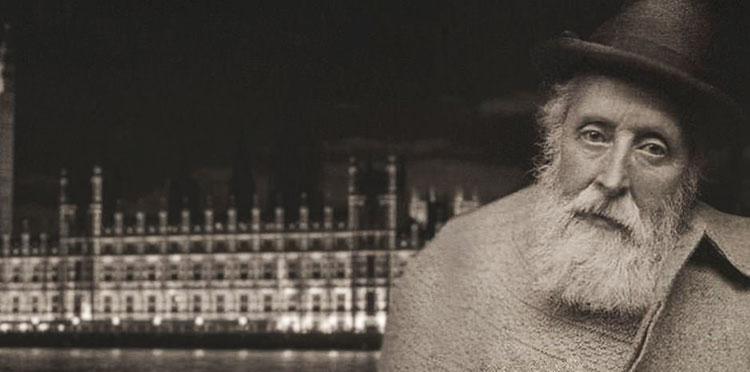
Auberon Herbert
(1838-1906)
Herbert is relying on two intimately related theories:
-
first, "the
universality of rights"
-
second, "a
natural harmony of interests"
The universality of
rights means that every individual has the same natural rights to an
equal degree.
Race, gender, religion or other secondary characteristics do not
matter; only the primary characteristic of being human is important.
A natural harmony of interests means that the peaceful exercise of
one person's individual rights does not harm the similar exercise by
any other person.
My
freedom of conscience or speech does not negate my neighbor's.
The peaceful jurisdiction
I claim over my own body does not diminish anyone else's claim of
self-ownership.
Indeed, the more I assert the principle of
self-ownership, the stronger and more secure that principle becomes
for everyone.
Only in a world where rights are not universal, where people's
peaceful behavior conflicts, does it make sense to accept the need
to sacrifice individuals to a greater good.
This is not the real
world, but one that has been manufactured for political purposes...
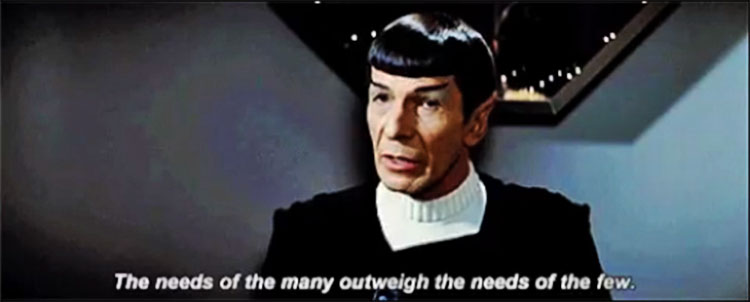
A scene from Star Trek's
The
Wrath of Khan (1982)
Herbert explained a key assumption that underlies this faux world:
the acceptance of the
"greater good" itself.
He asked,
"Why are two men to
be sacrificed to three men? We all agree that the three men are
not to be sacrificed to the two men.
But why - as a matter
of moral right - are we to do what is almost as bad and immoral
and shortsighted - sacrifice the two men to the three men?
Why sacrifice any
one... when liberty does away with all necessity of sacrifice?"
Herbert denied the
validity of,
"this law of numbers,
which... is what we really mean when we speak of State
authority… under which three men are made absolutely supreme, and
two men are made absolutely dependent."
Instead of accepting the
law of numbers as an expression of greater good, Herbert viewed it
as a convenient social construct, calling it,
"a purely
conventional law, a mere rude, half-savage expedient, which
cannot stand the criticism of reason, or be defended... by
considerations of universal justice.
You can only plead
expediency of it."
To whom was the social
construct of conflict convenient? Why would a faux world of inherent
conflict be created?
By solving the
manufactured problems, a great deal of power was transferred from
individuals to a ruling class.
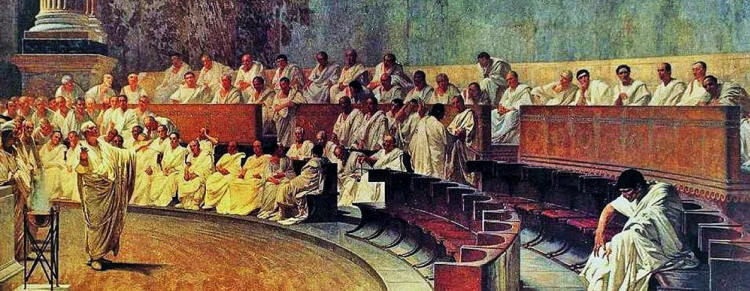
Cicero Denounces Catiline
in the
Roman Senate (1888),
by
Cesare Maccari
Herbert wrote,
"The tendency of all
great complicated machines is to make a ruling class, for they
alone understand the machine, and they alone are skilled in the
habit of guiding it.
And the tendency of a
ruling expert class, when once established, is that at critical
moments
they do pretty nearly what they like with the nation…"
Rather than solve a
social problem, the ruling class had a devastating effect on the
welfare of common people, who became,
"a puzzled flock of
sheep waiting for the sheepdog to drive us through the gate."
Ironically, by claiming
the collective was greater, the few were able to assume control over
the many.
The "greater good"
devolved to whatever served the interests of the ruling class.
But the process can be reversed.
It requires "individualizing" the
collective and the nation so that "will, conscience and judgment"
can return to every person...
At that point, society offers people "the noblest present" and the
greatest benefit possible,
"their own personal
responsibility."
| 







